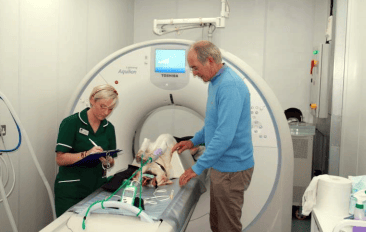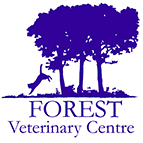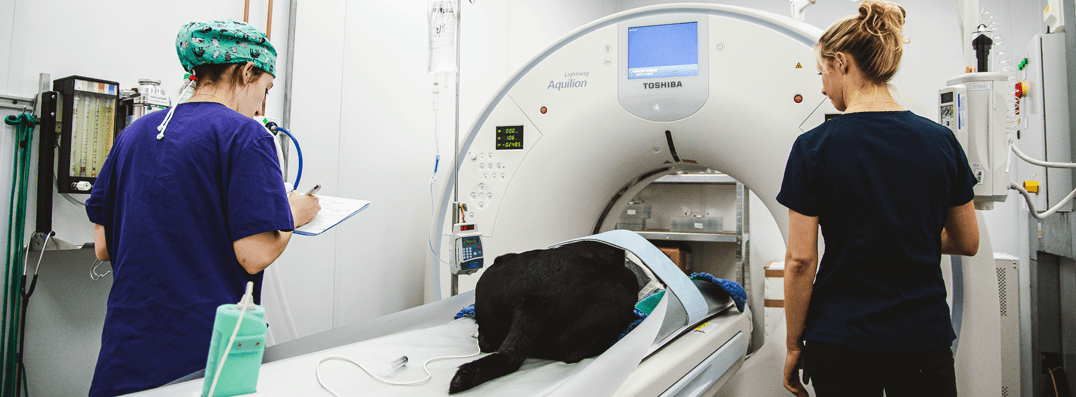We offer an out patient MRI and CT service to our referring vets in partnership with a team of Diploma holding radiologists from VetCT Consultants in Telemedicine.
 Over view of the service
Over view of the service
- Referring vet identifies a potential patient for MRI or CT scanning and completes the request form, which is faxed to 01992 573900 (the request forms are available from our office and website www.forestvets.com)
- Forest Veterinary Centre contacts the client directly to arrange appropriate consultation and hospitalisation appointment.
- Patient is taken to appointment by the owner.
- Vet from Forest Veterinary Centre discusses with owners as required, reviews the clinical history and performs a pre anaesthetic assessment.
- Diploma holding radiologist from VetCT are on hand if required to confirm which modality is appropriate and provide protocols if needed.
- Forest Veterinary Centre vet takes responsibility for anaesthesia /MRI or CT and recovery.
- Patient is discharged when clinically stable.
- Images are sent to reporting VetCT radiologist by Forest Veterinary Centre vet on the day of scanning. Images sent by 5pm will receive a next working day report if required as urgent.
- Reports are provided to Forest Veterinary Centre vet and forwarded to referring vet within 24-96 hours (working day defined as Monday-Friday 8.30am-5.30pm).
- Forest Veterinary Centre or referring vet (which ever is preferred) explains results to the owner and can contact reporting VetCT radiologist for additional support and advice as required.
- If the patient is referred to another practice then both the images and the report can be promptly forwarded as required.
Patient selection
Patients will be scanned on an outpatient basis and therefore must be clinically stable and suitable for transport to and from Forest Veterinary Centre and anaesthesia and recovery at Forest Veterinary Centre within 1-2 days. Clinically unstable patients should not be considered for imaging unless ambulance transportation, constant veterinary supervision and access to hospital facilities can be provided.
MRI and CT can be extremely helpful in the diagnosis and evaluation of certain clinical conditions. A list of suggested clinical indications can be provided. In addition, a Diploma-holding Specialist Radiologist can help you choose the correct modality.
There are some situations where outpatient MRI is not appropriate. In particular, please complete the safety section of the request form carefully.
NB: If you are uncertain of which body area requires imaging and require a specialist to localize the condition (e.g. neurolocalisation), then it is best to consider full referral of the case.
Contrast media
Contrast media are often used in MRI/CT scanning. Again, these are not suitable for all patients and the owner must be made aware of the associated risks.
Please complete the safety section of the request form and read the advice carefully.
Patient preparation
- Patients to be starved for 12 hours prior to admission if 6+ months or older.
- Patients to be starved for 6 hours prior to admission if between 3 months and 6 months old
- Patients can have access to water up to 2 hours before admission.
- All MRI will need a general anaesthetic.
- I/V access will be required for all patients.
Responsibility for the patient
The patient remains under the care of the primary referring vet, but will temporarily become the responsibility of the Forest Veterinary Centre while performing anaesthesia/sedation at the scanning site during preparation, the imaging procedure and recovery.
A client consent form will be completed for each case at Forest veterinary Centre as normal.
Expectations
Each examination will be followed up with a full report by the next working day after that scanning appointment. The report is written by a Diploma holding Specialist Radiologist from VetCT Consultants in Telemedicine (www.vetctspecialists.com). Please contact VetCT for a sample report. The report will include pertinent images and differential diagnoses.
In many cases ( MRI/CT) can give clear and very full answers as to the pathology present, but it should be noted (and the client should be warned) that imaging may not be definitive or may even be normal. Any further intervention after imaging remains the responsibility of the primary referring vet.
Note: VetCT accept no legal/professional responsibility for the care of the patient, as their reporting service does not include a veterinary professional on site.
Owner discussion (notes for the referring vet practice)
Important points to consider
- MRI scanning is widely used in veterinary patients and is generally very safe. It does however utilize a large magnetic field and it is very important to be clear about whether the patient has any metallic implants or a pacemaker. Access to the patient is also limited during the scan, but they will be monitored remotely by the vet and team. Anaesthesia is required for all MRI scans. Please refer to the patient preparation details. Scanning takes between 30-90 minutes.
- Contrast media may be used for MRI. These carry a low risk of adverse reaction (such as anaphylaxis) and are contra-indicated in patients with renal disease.
- IV access will be required. The patient will therefore be clipped accordingly.
- Issues associated with patient transport and recovery.
- Expectations from the MRI /CT examination (see above).
- Costs (see MRI/CT guide of costs form).

